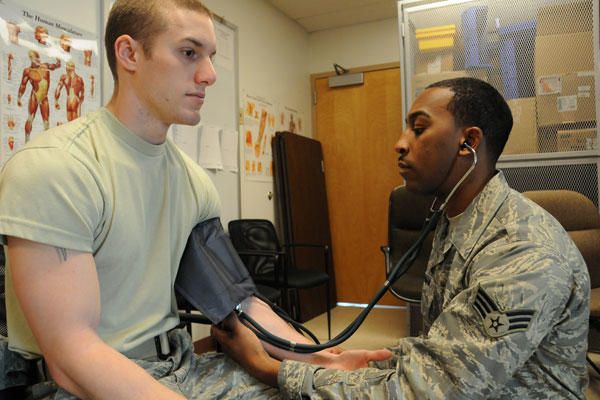A new pilot program will give some Tricare users who are admitted to a civilian hospital through the emergency room the option to transfer to a Military Treatment Facility.
Active-duty patients, meanwhile, may be ordered to make the switch.
The program, announced on Tuesday, will start July 25 and run for up to two years in at 11 Army, Air Force and Navy locations nationwide.
Officials want the moves to save both the Tricare system and beneficiaries money by switching patients out of higher-cost civilian care and into the military system, according to policy documents.
Users who qualify for MTF care, including Tricare for Life beneficiaries, will be offered a move to a military facility via an ambulance, the policy states -- but only if doctors both at the civilian hospital and the military facility agree that they are stable enough to move and if the latter has space.
If the patient is an active-duty service member, he or she can be ordered to swap, while non-active duty patients will not be forced into moving, the documents state.
While the pilot program seeks to save money, the policy also acknowledges the savings could be offset by the cost of moving patients from a civilian facility to the hospital via ambulance.
Even so, big savings could be in store for Tricare users who typically foot a cost share for visiting a civilian facility, such as Tricare Standard users or Tricare Reserve Select members. And although they will likely have to pay a cost share for any ambulance transport to the MTF, doing so is likely to be less than the cost share for any extended hospitalization, according to the documents.
Although many MTFs currently have patient transfer agreements with local civilian hospitals, the formal pilot program allows Tricare's regional contractors to take a larger role in arranging the transfers, Tricare officials said.
The pilot was started at the request of the military services, they said.
"The pilot project enables DoD to evaluate the operational and financial changes necessary to further the Military Health System's goals of supporting medical readiness, enhancing MTF provider proficiency and graduate medical education programs, saving taxpayer dollars, reducing beneficiary costs and enhancing beneficiary satisfaction," Kevin Dwyer, a Tricare spokesman, said in a statement.
The program will start July 25.
Participating locations include Madigan Army Medical Center, Tacoma, Washington; Naval Hospital Bremerton, Washington; Womack Army Medical Center, Fort Bragg, North Carolina; San Antonio Medical Center, San Antonio, Texas; Navy Hospital Jacksonville, Florida; Naval Medical Center Portsmouth, Virginia; Joint Base Langely-Eustis, Virginia; David Grant Medical Center, Travis Air Force Base, California; Mike O’Callaghan Federal Medical Center, Nellis Air Force Base, Nevada; Wright-Patterson Air Force Base, Ohio; Eglin Air Force Base, Florida; and Walter Reed National Medical Center, Bethesda, Maryland.
-- Amy Bushatz can be reached at amy.bushatz@military.com. Follow her on Twitter at @amybushatz.




























